#road to hell paved with good intention
Text

getting back into the untamed and i had a thought. / follow for more yllz babygirlism
#i saw someone a while ago talking about how wwx always has good intentions….#his personal road to hell was paved with good intentions yes but i’m not sure where making a guy eat his own legs fits#it is so funny to me how the tiger tally/yin iron influences wei wuxian differently in each adaptation#i remember making a sliding scale of how ‘culpable’ wwx is from adaptation to adaptation#based on how they portray the mental effects of the iron#but for the life of me i cannot find it :(#wwx really said ‘if i had a cursed amulet i simply wouldnt be corrupted🙄🙄’#that’s basically what he tells lan zhan in this episode…. if necromancy was having ill effects i would notice#and you know. at this point he is lying about everything. but i do wonder how much he actually believes that 👁️👁️#how much of his mind is resigned to doing whatever needs to be done to exact revenge regardless of harm to himself#and how much genuinely believes that he’s smart and competent enough to make it through whole#the answer of course is BOTH!! bisexual pride#mdzs#art#mdzs spoilers#wei wuxian#lan wangji#wangxian#mo dao zu shi#grandmaster of demonic arts#grandmaster of demonic cultivation#my art#the grandmaster of diabolism#cql#the untamed#魔道祖师#陈情令#mdzs meme#doodle#lmao
4K notes
·
View notes
Text
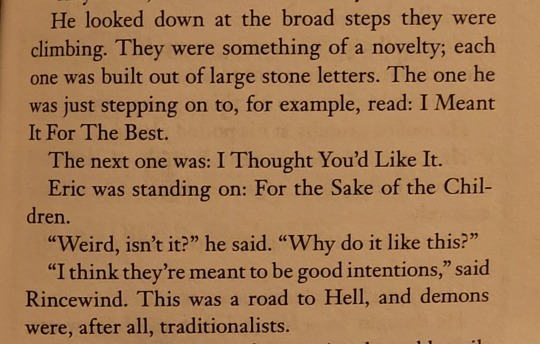
624 notes
·
View notes
Text
wei wuxian vs. pragmatism: what MDZS intends to say about righteousness
copy/pasting most of my rather bitchy reply into its own individual post because i think it deserves to stand on its own.
so i think we can all agree that MXTX intends for us to read MDZS and conclude that wei wuxian is ultimately a deeply heroic and righteous person. whether you as the reader agree with this assessment of wei wuxian's moral character is another question entirely, but at the very least it is fairly obvious to all of us that MXTX intends for us to read him as a good person.
so why does MXTX call wei wuxian a good person? what aspects of his character and which of his choices make him a good person? what moral framework and what definition of morality does MXTX employ in order to call wei wuxian a good person?
i posit that MXTX argues that wei wuxian is heroic precisely because he is not pragmatic - because he adheres to his moral ideals despite the consequences, and because he did not make moral sacrifices at critical junctures of his life. the first half of this post will argue that wei wuxian is not pragmatic. the second half of this post will argue that this is exactly why wei wuxian is heroic, and that the moral framework employed by MXTX is deeply idealistic instead.
so let's begin.
let's start by establishing two things.
first: what MXTX argues about morality through the narrative of MDZS and the reader's own beliefs about morality are two different things. me saying "MDZS argues that xyz is righteousness" and me saying "i think xyz is righteousness" are two different statements. the following analysis is concerned not with what i myself consider to be righteous, but rather what MXTX argues through MDZS is righteous.
second: wei wuxian is not pragmatic.
what does it mean to be pragmatic? unless we are speaking about the school of philosophy specifically (which i am not here), being pragmatic means being grounded in reality and focused on practical outcomes. it means being result-oriented and considering the consequences of your actions before you act; it means acting only after you have considered the potential consequences of all possible courses of action and have then decided which outcomes are acceptable. being pragmatic also means recognizing when achieving everything you want is impossible. and, in such situations, being pragmatic thus entails compromising to achieve a desired outcome, even if that means you don’t get everything they want. to put it in edgier terms, being pragmatic means being able to make moral sacrifices.
an idealistic person attempts the impossible. a pragmatic person recognizes when something truly is impossible.
wei wuxian is not pragmatic.
first, wei wuxian is not someone who carefully considers the consequences of his actions before he acts. in fact, he displays a startling lack of consideration for consequences. it repeatedly falls upon other characters to either try (and fail) to hold him back.
when wei wuxian punched jin zixuan for insulting first jiang yanli and then jiang cheng, did he consider that jiang fengmian and jin guangshan might then dissolve the betrothal, and that jiang yanli might have wanted to make a decision regarding that on her own? no. he just punched jin zixuan because he was mad that jin zixuan had insulted two people he loved.
when wen chao threatened mianmian, and lan wangji and jin zixuan stood up for mianmian, and then wei wuxian stood up for them by holding wen chao hostage in turn - did he consider that there might be consequences for humiliating and threatening the life of the son of a warmongering great sect leader who has already proven capable of attacking other sects? no. did he stop and think "alright, wen ruohan has already attacked the cloud recesses, which proves that he's willing to wage war against the other sects. threatening the son of a sect leader is an easy way to earn any sect leader's ire, and since i'm the first disciple of the jiang sect, this puts not just me but the entire jiang sect on wen ruohan's shitlist"? no. it would be one thing if wei wuxian weighed this possibility and then decided that rescuing an innocent girl and the people who defended her was more important was worth the risk - that would show that he considered the consequences and then made his choice. but the thought simply never entered his mind. he acted simply because he wanted to save mianmian, jin zixuan, and lan wangji from the wens; he did not think beyond that.
when wei wuxian busted the wen remnants out of the qiongqi pass labor camp, did he have a clear plan as to how he was going to weather the political fallout? did he have a plan more detailed than "live quietly in the burial mounds until everyone forgets about us"? no. when jiang cheng challenged him as to how he was going to survive the situation, he did not in fact offer anything more concrete than "we'll just wait for everyone else to forget about us." he blustered about being a once-in-a-generation genius who could accomplish the impossible, but he provided no actual plan as to how he was going to do it. this leads me to conclude that wei wuxian did not in fact have a long-term plan for handling the consequences when he went ham at the qiongqi pass camp - that, instead of weighing the consequences and then making his decision, he instead decided immediately that this was something he had to do, consequences be damned.
and then - on top of this - all of his following actions then point in the exact opposite direction of his stated plan of waiting for everyone to forget about them. because instead of doing anything to fade into the background, everything wei wuxian did instead just convinced the jianghu he was an intolerable threat.
and this was not a sustainable strategy.
one thing i really appreciate about MXTX is that she does not make the rest of the jianghu into one-dimensional villainous morons. it's quite easy for lazy writers who want a persecution plotline to have the rest of the story's society magically start hating on the protagonist for no good reason, to make every background character in the story's world a three-braincell moron. but MXTX is not that author. it speaks to MXTX's skill as an author that, from the perspective of the rest of the jianghu, fearing wei wuxian as a mortal threat was an entirely reasonable conclusion for them to come to.
first, the gentry's most recent direct interaction with wei wuxian during this time period is him threatening to kill all of them. when jin zixun doesn't give him the information he wants, wei wuxian straight up says: "if i want to kill everyone here, who can stop me? who dares stop me?" this is a threat! and - surprise - threatening to kill people naturally makes people think that you want to kill them!
next, wei wuxian refined wen ning's dead body into the first sentient fierce corpse in history, and also the strongest fierce corpse in living memory - and then took wen ning with him on night-hunts. that's where the reputation of "the yiling patriarch and his ghost general" comes from. this very naturally made the rest of society fear him even more, because now the guy who has just recently threatened to kill you has demonstrated even more of the power to easily do so! the unparalleled power to do so, which no one else possesses and it would be very hard for anyone else to counter! add in the fact that wei wuxian's activities were also attracting prospective disciples - people gathering outside the burial mounds because they wanted to learn demonic cultivation - and naturally the public is even more frightened, because now it looks like the guy who threatened to kill all of you is also gathering the political force to do so!
the public is incorrect about wei wuxian's intentions, of course. but what does wei wuxian do to correct these misconceptions? to rehabilitate his public image, because now his public image has the life of not just himself but also all the wen remnants under his protection riding on it? to prove to the public that he isn't an active threat to their lives - that he does not seek to murder them all in their beds - that it is safe for them to allow him to live, and that they can in fact survive if they don't kill him?
nothing.
it would be one thing if the story mentioned how wei wuxian tried to correct the malicious rumors about himself and failed. but that is not what happened. what happened is that wei wuxian sat on his corpse mountain and let everyone else say what they wanted to say. and when he left his corpse mountain, it was to bring his one-of-a-kind unparalleled sentient fierce corpse with him on night-hunts, which of course just fanned the flames of the rumors instead. he doesn't even tell the prospective pupils camped on his front door to fuck off - he just sneaks in through the back door.
this is not pragmatic behavior. though you can argue that wei wuxian's strategy here was to become so powerful and so scary that no one would dare try to fight him, anyone with a brain can tell you that this is not a sustainable solution in the long-term. first, if you want to use threats to keep someone from attacking you, you also need to promise stability - you need to give people the reassurance that if they don't start shit with you, then you'll leave them alone too. if you drive the "threat" factor too high, as wei wuxian did, you instead end up convincing people that if they do nothing you'll kill them anyways - that they have no choice but to kill you if they want to survive.
second, if you want to use threats to keep someone from attacking you, you also need to prepare for the inevitability that, if someone does end up getting hurt, everyone will blame you first and no one will want to hear your side of the story. after all, if someone gets hurt, then the first suspect everyone looks towards will be the guy who's been consistently saying "i'm strong enough to hurt you! i'm strong enough to hurt you! don't start shit with me because i'm strong enough to end you!" for the past few months. this is basic common sense. and yes, the society of MDZS is unfair - wei wuxian deserved a proper trial and investigation after the death of jin zixuan. but the fact that society is unfair is something a pragmatic person would have recognized and planned for.
wei wuxian did not recognize and plan for this reality. even after he accidentally kills jin zixuan, wei wuxian still insists that if only the jianghu investigates jin zixun's hundred holes curse, they'll see that wei wuxian didn't cast the hundred holes curse, they'll see that there was more scheming going on, etc etc. wen qing has to directly spell out for him that, at this point, society no longer cares about the truth of the matter. it seems that wei wuxian was actually oddly idealistic about the true nature of his society all the way until the very end.
all of this leads me to conclude that, when wei wuxian busted the wen remnants out of the qiongqi pass labor camp, he did so without considering the consequences of his actions. he assumed that he could improvise and weasel his way out of this situation, as he's always done in the past with his typical genius - only this time, he was wrong.
wei wuxian acts without considering the consequences of his actions. he does not make a decision only after carefully deliberating over all of the potential outcomes - not at all. instead, he acts in the moment - not out of any rational consideration of potential outcomes, but rather because it is simply something he must do. this by definition makes him a deeply unpragmatic person.
to put it into more familiar terms, for wei wuxian, the righteousness of an action comes not from its consequences, but are rather inherent to the action itself. even if he were doomed to fail, he could not give up on the wen remnants.
second, at critical junctures, wei wuxian is unable to make moral sacrifices. to be pragmatic is to know when you have to sacrifice: to know when, in order to achieve the most inalienable of your goals, you have to give up on some of your other goals. this is something wei wuxian is consistently unable to do.
of course, when it comes to his own wellbeing, wei wuxian is all too willing to sacrifice. he'll carve out any number of his internal organs to save those he loves. but this honestly speaks less to wei wuxian's moral framework and more to his lack of self-worth from a troubled upbringing.
because, when it comes to any moral cause, wei wuxian is entirely unable to sacrifice anything, even if being unable to sacrifice entails more negative consequences. wei wuxian could not sacrifice mianmian, jin zixuan, and lan wangji to wen chao and his goons, so he took action and took wen chao hostage himself. to sit back and do nothing as wen chao threatened the lives of those three was simply unthinkable for him - even if it meant taking a course of action that put yunmeng jiang in danger.
wei wuxian's relationship with jiang cheng deteriorated because jiang cheng did not know about the golden core transfer: because jiang cheng did not know that wei wuxian could no longer cultivate, from jiang cheng's point of view, it looked like wei wuxian was just refusing to help out and fulfill his promises for kicks. wei wuxian could have made things a lot easier for himself and also any wen remnants he chose to rescue had he simply told jiang cheng the truth - but he knew that finding out the truth of the golden core transfer would make jiang cheng miserable, and [jiang cheng's happiness] was not something he was willing to sacrifice.
wei wuxian's single most prominent moral decision is his refusal to allow the wen remnants to be sacrificed. anyone with a shred of political sense had to know that rescuing the wen remnants and then protecting them would be near impossible - that it entails making an enemy of the jin, and due to the jins' power, the entire jianghu. wei wuxian himself knew this; he is no moron. wei wuxian also had no long-term plan, no allies, and significantly less power than the rest of the world believed. yet, despite this all, he acted anyways, because he could not let the wen remnants be sacrificed.
the wen remnants wei wuxian rescued from the qiongqi pass labor camp included both regular civilians and cultivators. perhaps wei wuxian could have negotiated a proper release for the non-cultivating civilians, such as granny wen and a-yuan, had he chosen to give up on the cultivators. but - the question of whether this would have worked or not aside - this was not a sacrifice wei wuxian would be willing to make.
nor could wei wuxian sacrifice the safety of yunmeng jiang. i am firmly of the belief that, had yunmeng jiang formally stood by wei wuxian's side after wei wuxian attacked the jin-run labor camp, lanling jin would have eventually declared war on yunmeng jiang, and yunmeng jiang's would inevitably be destroyed. both wei wuxian and jiang cheng understood this as well - which is why wei wuxian told jiang cheng to let him go.
(you can argue - successfully - that wei wuxian did in fact sacrifice [his obligations to yunmeng jiang and his promise to jiang cheng] by leaving yunmeng jiang to protect the wen remnants. this is true. but i think that - from wei wuxian's point of view - this was not much of a sacrifice, because due to wei wuxian lacking a golden core, he already viewed himself as mostly useless to yunmeng jiang. so him leaving - in his view - is not really that much of a loss for yunmeng jiang.)
wei wuxian promised wen qing that he would return wen ning's consciousness to his corpse. when wei wuxian made this promise, he had no idea if he could actually pull it off or not. but then he did - and, in the process, created the most dangerous weapon the jianghu had seen in living memory. wen ning specifically, or moreso wei wuxian's inability to control him, leads to so much of wei wuxian's eventual downfall: wei wuxian loses control of wen ning and accidentally kills jin zixuan; when wen ning goes to turn himself in at jinlintai, he ends up going berserk again and killing another 10-20 jin and lan cultivators, which leads to the nightless city pledge conference. frankly, wei wuxian could have avoided a lot of trouble - or at the very least, a lot of the public's fear - had he not raised wen ning from the dead. it's not like he'd be completely defenseless without wen ning, either. but wei wuxian promised wen qing he would resurrect wen ning - and he could not sacrifice his promise to wen qing because of what wen qing had already done for him.
a pragmatic person is able to make sacrifices, including moral ones. at the very least, a pragmatic person recognizes when sacrifice is inevitable, when all paths lead to something being lost. a pragmatic person, put in the trolley problem, would recognize that there were only two options and that both options involve sacrifice: either he must kill one person, or he must allow five people to die. there is no path forwards in which all six people live.
wei wuxian is unable to make moral sacrifices. he clings on to all of these moral causes, all of these promises and obligations, and it is precisely because he attempts to hold onto all of them that he ends up losing everything. to reuse the previous example, wei wuxian in the trolley problem tried to save all six people because he could not accept any of the sacrifices made inevitable by the trolley problem.
to put this all together - wei wuxian is not a pragmatic person. he makes decisions with his gut, not his head - he does not consider the consequences of his actions before he acts. nor is wei wuxian able to make sacrifices - even necessary ones in order to avoid greater tragedies.
but. none of this means that wei wuxian is not a deeply heroic person. rather, to do what you believe to be righteous and attempt to live up to your ideals despite the consequences is exactly what MXTX lauds as moral. and to be unable to make a moral sacrifice when everyone else in your society easily does so is in fact deeply heroic.
it is precisely because wei wuxian is not pragmatic that MXTX declares him a hero.
some people, including myself, favor a moral framework that centers pragmatism and reason as virtues. to us, the ideal moral character is someone who makes decisions based on reason and not emotion, who considers the potential consequences of every course of action before making a decision, and who then, based on these inferred future consequences, uses reason to deduce which of all of the possible outcomes is the most preferable.
but this does not in fact describe wei wuxian, nor is this how wei wuxian views ethics. and to be honest, i don't think this is how MXTX views ethics either.
in all three of her stories, MXTX repeatedly comes down harder on the characters who make pragmatic decisions, the characters who are willing to sacrifice. in fact, killing sunshot soldiers while acting as wen ruohan's spy, and then killing nie mingjue's men in order to ensure a chance at killing wen ruohan and saving nie mingjue, was the pragmatic thing for meng yao to do, because that was the least bloody path forwards towards a sunshot victory over qishan wen. in fact, cutting ties with wei wuxian after he attacked the jin-run qiongqi pass labor camp was the pragmatic thing for jiang cheng to do, because it was the only path forward that did not put yunmeng jiang, his first and foremost responsibility, in the line of fire. and yet (though the situation is less clear with jin guangyao), MDZS as a narrative criticizes both jin guangyao and jiang cheng for these decisions - because, to MDZS, righteousness does not lie in pragmatism.
(this is a statement i personally disagree with. but we are here to discuss what MDZS wants to say about pragmatism and righteousness, not what i want to say about pragmatism and righteousness.)
by contrast, the one single act for which deeply controversial jiang cheng is ultimately lauded for in the narrative is also his single least pragmatic, most emotional act. the one single act of jiang cheng's that MDZS does not criticize is when, after the fall of lotus pier, jiang cheng ran out from his hiding spot to distract the wen soldiers from seeing wei wuxian. from a filial, duty-based point of view, this was a deeply stupid and unpragmatic course of action: jiang cheng's first and foremost duty, as the sole surviving jiang and new sect leader jiang, was to survive, rebuild his sect, and avenge his parents. from a consequentialist point of view, this impulsive choice is also what led to the domino-fall of tragedy that followed, since jiang cheng then got captured and had his golden core melted, which then led to everything else. yet this stupid, unpragmatic, and impulsive decision is ultimately the one act MDZS considers to be jiang cheng's single most heroic.
the key as to what MDZS considers to be heroic, what it considers to be righteous, lies in the jiang family motto: 明知不可而为之, attempt the impossible. this line, taken from the analects of confucius, can be considered to be a deeply deontological ideal. i find this twitter thread (warning to my followers: does kind of dunk on JC) to be rather helpful in elucidating this line's meaning.
to attempt the impossible, to try what shouldn't be tried. "ask yourself not whether you can do it, but whether you should...consider not the result but rather the journey - have a clear conscience regardless of outcome." in other words, what matters is less whether you succeeded or failed, or what sort of outcome your actions brought about - what matters is that you tried. what matters is that, in the face of overwhelming odds, you tried to do what you think is right. and even if you end up failing - even if everyone you sought to protect ended up dying - the fact that you tried still has moral weight.
this is why it was righteous of wei wuxian to save the wen remnants - even though the ultimate consequences of that decision were overall negative, even though everyone wei wuxian tried to protect died. in fact, if wei wuxian had died immediately - if he had been shot down by jin archers at the qiongqi pass labor camp the moment he came within their range - if he had died before any wen in the labor camp realized someone wanted to save him - he would still be a righteous person. because, for MDZS, what makes an action righteous is not its consequences. for MDZS, what makes a person righteous is not what impact their actions have on the world, but rather that they have the sort of moral character that leads them to never give up on their ideals.
wei wuxian does not consider the consequences of his actions before he acts. or, should i say - wei wuxian makes decisions despite their consequences, because despite the consequences there are simply some moral causes he simply cannot give up on. wei wuxian did not save the wen remnants because it was pragmatic to do so. it was in fact deeply unpragmatic to do so. no - wei wuxian saved the wen remnants without a concrete long-term plan, without having thought through anything beforehand, with the knowledge of how weak he was in reality - because he could not give up on the wen remnants, consequences be damned.
to have some moral causes you simply cannot give up on, no matter the consequences - to MXTX, is deeply heroic. in this sense, MXTX's moral philosophy is not pragmatic at all, because to be pragmatic is to be concerned with practical consequences. instead, both wei wuxian and MXTX herself are deeply idealistic, because what matters to them are ideals and principles that extend beyond consequence.
as the linked twitter thread notes, this is why MXTX waits until the very end of the book to reveal that wen yuan, now lan sizhui, lived. this is why wangxian only meet mianmian and her family at the end of the book. this is why all of the cumulative positive impacts of wei wuxian's resurrection - jin ling forgiving wei wuxian, jin guangyao, and wen ning, for one - are kept to the end of the story: because MDZS needs to move away from the consequentialist argument. MDZS needs to establish that wei wuxian's righteousness is separate from the impact of his actions: that wei wuxian isn't righteous merely because his actions had a positive impact for which others can thank him, but rather because the actions he undertook were inherently righteous on their own. that even if none of these positive impacts existed - if wen yuan had also died, if mianmian hadn't made it - then wei wuxian's choices would still be moral.
this is also why MDZS ultimately comes down harder on characters like jiang cheng and jin guangyao, even though a more results-oriented moral framework would instead laud such characters. both jiang cheng and jin guangyao are deeply pragmatic characters: they put concrete results before abstract moral ideals, and they're willing to compromise on their ideals in order to achieve better results. i am a JC stan and a jiggy apologist because of these exact traits. but MDZS is a narrative that criticizes such pragmatism and instead holds up wei wuxian's idealism as a moral ideal - so, in order to advance its themes, the MDZS narrative ends up criticizing both jiang cheng and jin guangyao.
ultimately, this idealism - this criticism of pragmatism - lies at the heart of MDZS's themes. wei wuxian's righteousness is directly connected to the fact that he is not pragmatic. the fact that wei wuxian makes moral decisions despite the consequences, and that he is unable to sacrifice any moral cause - is all part of what makes him at once deeply unpragmatic and deeply heroic.
---
you see, the funny thing here is that i personally disagree with this theme. as i've said before, i'm a utilitarian. to me, the morality of an action does in fact arise from its consequences; to me, someone who compromises on their ideals to achieve better results is preferable to someone who adheres to all of their ideals and then loses everything. the character i consider to have had the greatest positive impact on this story's world is jin guangyao. the character i consider to have most dutifully fulfilled his obligations is jiang cheng.
therefore, i disagree with basically everything i wrote up there about "trying": i think that if you try to do the right thing, fail epically, and in the process of your failure get a bunch of other people killed as well, the fact that you failed this badly does in fact matter quite a bit. the bulk of my more haterish posts are born from this fundamental disagreement with what MDZS posits is righteousness.
however. as a reader i must recognize that [what i consider to be moral] and [what the author of this story considers to be moral] are two different things. my own moral philosophy may be heavily results-oriented, but MXTX's is much less so. therefore, regardless of what i think of wei wuxian, i conclude that MXTX ultimately intends for us to read wei wuxian as a heroic figure for the exact reasons i gave above - and that fact must then inform every analysis of MDZS i write.
#mdzs#wei wuxian#yanyan speaks#this analysis is also focused on wwx's first life bc wwx in his second life seems to give much fewer shits about moral causes tbh#second life for wei wuxian + all the good rewards at the end is basically a victory lap lol#anyways rip jiang cheng and jin guangyao for being pragmatists in a work that celebrates idealism#get dunked on ig#anyways wwx antis will read the above and go “well isn't this just a lot of words for 'the road to hell is paved with good intentions' ”#and like. yeah. that's correct#but mxtx is placing the majority of the moral weight on those good intentions imo#to mxtx - it is better to have heroic intentions and fail epically than it is to have unheroic intentions and achieve decent results.
180 notes
·
View notes
Text
okay but real talk i personally reeeally do not like the evil miquella theories especially the mIqUelLa is gRiFiTh ones i have to roll my eyes 😒
imo it just.,,, completely goes against his character??????
like his whole thing from the very beginning was to cure malenia from her crippling rot and then created a haven for outcasts of the golden order, so he's had nothing but good intentions from the very beginning. and if he were to become evil or some shit out of nowhere, it would be so contradictory to him and what the lore says he stands for and it feels like it would be just a cheap "pull out the rug from under you" moment :/
the one thing that i do like is that yeah, he has compelling powers and uses love to win people over, BUT THAT DOESNT HAVE TO BE A BAD OR EVIL THING????? AND THERES SO MANY PEOPLE THAT SEE IT AS SUCH AND IM JUST LIKE
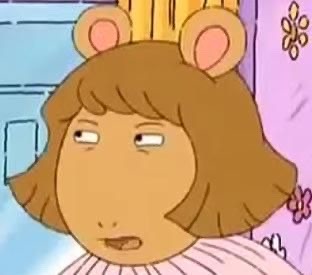
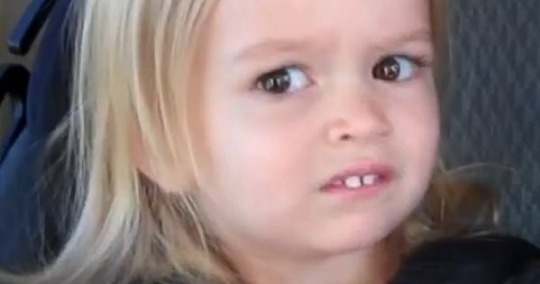
and honestly it would be even better for miquellas character if he was acutely aware of his powers to compel affection and he too saw it as a little shmarmy and tried to mitigate his abilities

and this whole line here makes me firmly believe that miquella, as he is now, does not have a shred those compelling abilities or anything for that matter.
so Miquella literally gave up EVERYTHING to even be able to come to this world of shadow because there is something here that he sees as extremely important for the fate of the world.
Miquella is literally the epitome of a being who is both kind and humble.
And that is what makes Miquellas character so interesting. Because in the context of all the Souls games where ruin and depression is practically the norm, a character that stands for hope and actually has the power/chance to grant hope to the rest of the world is so incredibly special.
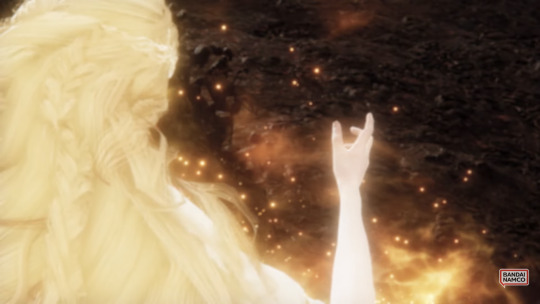
#now dont get me wrong#i dont think miq is evil but i DEFINITELY think that miq has ahd to make many morally grey choices to get where they are today lol#miq is smart as hell and has his own agenda for the world so they have to be doing some scheming behind the scenes#in a dog eat dog world like the lands between you gotta do what you gotta do to survive/excell#but i believe that miq is trying his best to be a true and kind individual#after the road to hell is paved with good intentions#uri posts#elden ring#miquella the unalloyed#miquella#shadow of the erdtree
207 notes
·
View notes
Text
Kind of bummed out that The Batman's successors will likely focus more on "grounded" villains instead of the likes of Pamela Isley, Basil Karlo, Waylon Jones, or Victor Fries (or if they are present, they'll likely have some kind of symbolic association to their powers rather than outright), just because in my opinion, the first movie would have established in the background if sentient plant powers or any kind of abilities were even in the realm of possibility for Gotham.
#It should be said I have an arc for how I think the movies should go#that I think works with Batman's key traits and themes#and I shall happily give it to DC because I don't trust them#but The Batman is very street-level focused#lots of emphasis on the mob/systematic corruption/good intentions paving the road to hell#I think the street level crime shall predominate unfortunately#batman#bruce wayne#the batman 2022#battinson#dc comics
71 notes
·
View notes
Text
god: you can either go to heaven or get a proper glimpse of michael sheen's tummy. you can't do both
me:

#the road to hell is paved with good intentions fr#should i tag this#good omens?#idk#anyway#michael sheen#ineffabildaddy
60 notes
·
View notes
Text
I’ve seen a few people asking why Thrawn would attack the New Republic – shouldn’t he join them and fix the system from the inside, or just go back to the Ascendancy? Why would he destabilize the galaxy further?
But if you think about it
Really, the only reason Thrawn needs is to believe that the New Republic is a threat to the galaxy. Which, well...
Thrawn joined the Empire to oppose the Grysk, because Thrawn believes in a strong military. Thrawn’s not good at politics, and deals with everything in military terms – remember the Lioaoin's economic issues? That’s why he got along with the Empire, and why he put up with all their crap. In Thrawn’s head, big military = big victory = stop bad guys = good.
Enter the New Republic.
What are they doing? Disarming. While there are still pirates, the Hutts, Imperial Remnants, and, of course, the Grysk nipping at their heels. In the midst of a tumultuous time, they are deliberately weakening their ability to meet the challenges ahead, and opening the galaxy to invasion. Says Thrawn.
It doesn’t even matter if they’re Grysk influenced or just stupid – it’s the same result. The galaxy loses. His people lose. Says Thrawn.
What do you expect him to do? Join them? Of course not – he at least knows he’s terrible at politics. And the New Republic is all politics – it would put him at a disadvantage, in a fight he cannot afford to lose. And it would open him to attacks on fronts where he has no power: trials for war crimes, possibly leading to execution – or worse. The Mind Flayer.
You think Thrawn would risk his mind?
Besides, better to ask forgiveness than permission, as they say.
And if you want something done right, do it yourself.
Conquering the New Republic would be better for everyone, Thrawn says. It would save the galaxy from annihilation, allow him to turn the resources of the Empire against evil, bring peace and order to the galaxy and beyond. He would keep all the good of the Empire, Thrawn says, while getting rid of all of the bad, Thrawn says – whatever that means to him.
For the greater good, Thrawn says.
Everything he’s done has always been for the greater good, Thrawn says.
The tragedy is that he believes it.
#as they say#the road to hell is paved with good intentions#long post#star wars#thrawn#mitth'raw'nuruodo#the new republic#just some thoughts#things bouncing around my head#as i watch the new show#and hear people talking about it#good intentions don't excuse his actions#he means well#but he's caused harm#and will cause harm#because the harm he's causing#is a lower priority for him#than his own goals#“acceptable losses”#acceptable for who?#greater good for who?#well#that's the sticky part#morally grey characters everyone#grand admiral thrawn#my thoughts#ahsoka show#star wars: rebels#grysk#chiss ascendancy
173 notes
·
View notes
Text
I’ve been thinking about the oath of Fëanor and his sons. The oath is said to be cosmically binding, sure, but what does that mean? Does that mean it’s an impulse? That you feel driven to fulfill the oath? Or does it just mean that the consequences for failing are always looming, and there’s more room for free will? Is the threat of damning yourself the only driving force, or because of the cosmic nature of it does it compel you to complete it?
I think the way it’s left up in the air makes Maedhros that much more compelling - because he’s the most sympathetic out of Fëanor’s sons, he feels remorse and tries desperately to keep peace. But because of the oath he swore, he’s doomed to fight and kill for the silmarils. It’s hard to pin the title of villain on him because he’s sympathetic, he fights back against the worst of what his father has done, he’s a driving force against the Enemy and its evils. It’s definitely hard to pin the title of hero on him because of all the terrible deeds he’s done in the name of his father and the silmarils, the kinslaying, the kidnapping.
It’s clear he follows the oath no matter how much he does not want to. He follows it through and doing so kills him, because he cannot handle the weight of what he’d done, and it was never worth it. But was it his unwavering duty and honor to his word, along with the threat of what would happen if he broke the oath - or was there any cosmic drive to complete the oath due to its nature and the way it was sworn?
If it was always a matter of free will, would having refused the oath been something more honorable in the end? Or would that have doomed Beleriand even earlier than it was, without him there to fight against the Enemy?
#I feel like there’s that argument too of like. everyone knew the oath they vowed why wouldn’t they just give the silmarils up? and it’s lik#it’s meant to show how that inability to compromise was their downfall. and supposed to hammer in the fact of the danger of their oath and#the silmarils#of course they didn’t want to give up the power and novelty of the silmarils. they were cursed and the sons were cursed too#because they sword the oath their punishment was always going to be the follow through. they’re cursed to obtain the silmarils whatever the#cost. and the silmarils are cursed to those who touch it. those who get it will always want to keep it and the sons will always have to#fight for it#idk all this to say the way you view the oath can change maedhros from a sort of anti hero into a villain with redeeming qualities#something about the road to hell being paved with good intentions#lotr#lord of the rings#the silmarillion#silm#maedhros#z speaks
46 notes
·
View notes
Text
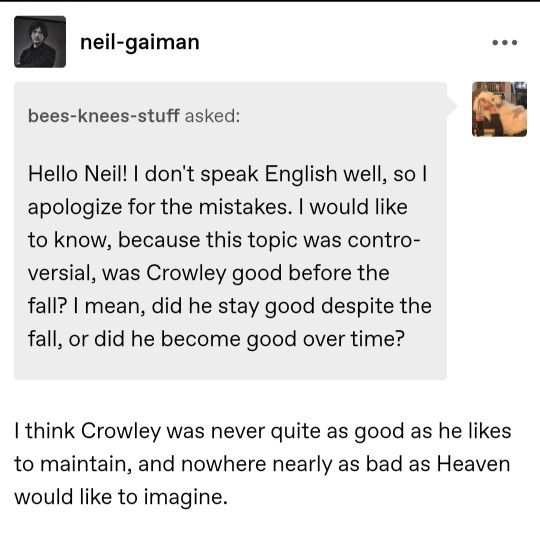
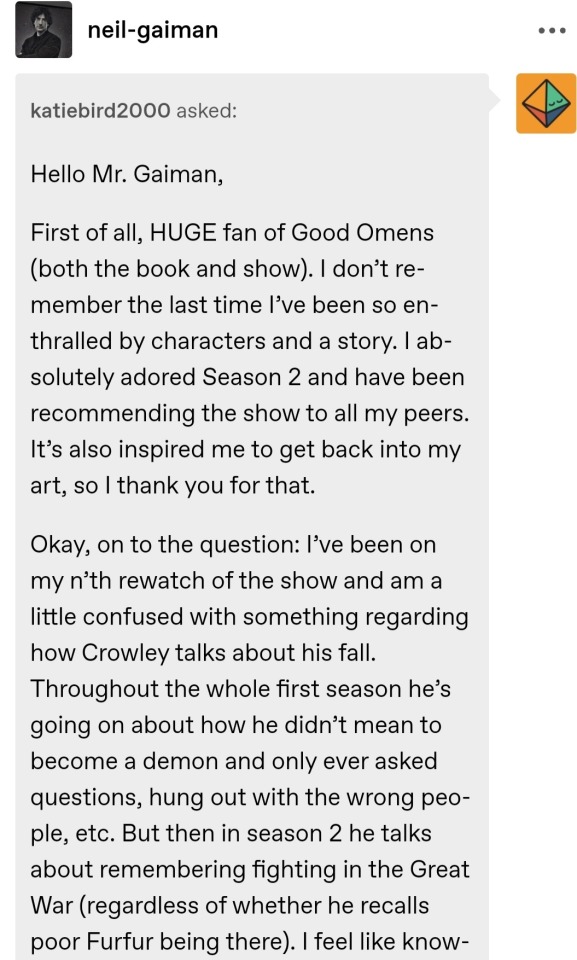
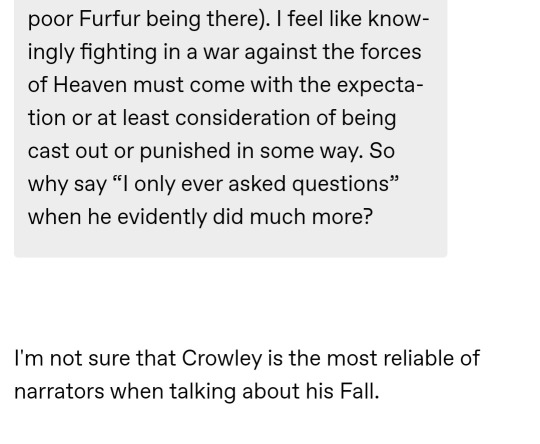
...It feels like these two answers are connected somehow.
#good omens#i mean#i don't think Crowley did something bad intentionally#but the road to hell is paved with good intentions#so far the most unbiased source about Crowley and his Fall is Furfur#As he has no visible reasons to lie about going to the battle with Crowley before the Fall
166 notes
·
View notes
Text
technically i played my first run of iwatex more than a year and a half ago. i focused heavily on exploration, managed to cure the shimmer and stop the famine without realizing it was possible to fail at those, and became a gardener with sym and dys.
but i remembered very little when i finally came back to the game (i remembered tammy dying, the gardeners, and the helios arriving, but that’s about it), so i decided to completely wipe my data and start fresh.
my new first run was… tragic. obviously tammy and hal died because it was a first run. i mostly did exploration. i went out and explored the month that tonin died, saw the fight, didn’t have the stats to try to save him so i ran for help, and then held his hands while he died, thinking i was tammy.
i stopped exploring for a while after that, and zeroed in on xenobotany again. i’d already done a little bit, and ended up creating the native hybrid right around the time i turned 13.
…which is also when sol’s mom pulls out the “you’re not doing enough” talk (possibly just if your rebellion is on the higher side? but mine has never not been, so i don’t know). which happened to be the event that triggered right after i made the native hybrid. so i was pissed that i’d just achieved a scientific marvel as a prepubescent child, only to be told i needed to try harder.
so i chose every angry option that presented itself. i despised her after that. i feel so strongly about it that i made it a foundational event to my view of my doctor!sol.
i stopped researching xenobotany, and started focusing on engineering instead. leaned back into exploration, too. until the famine got bad. i thought working on xenobotany might help things, make more plants and solve the problem long term.
…but it didn’t. and fluorescent died. which made feelings… complicated.
i leaned fully into engineering and exploration. managed to get to the ridges before ever fully exploring the valley. made efforts to befriend tangent, too. learned that the shimmer cure might be in the valley, but it wasn’t pollen yet so i wasn’t thinking super hard on it. helped her with some other stuff, too.
eventually, a pollen season hit and i remembered the cure. i went out exploring in the valley, but misremembered where the big event for it was and ended up using most of my stress getting to the wrong spot. i had to go back, relax for mid-pollen, and then went back out in late pollen.
i did manage to get to the glade, get what i needed, and get out. went back to the colony, last missing piece for the shimmer cure in hand.
and walked right into the story event where the shimmer finally kills geranium.
…i helped cure it the very next month. i, as a player, felt so… numb and useless about it. at this point i’d failed to save tonin, flulu, and geranium. not just failed, but tried and failed. tried so very hard.
i threw myself entirely into my relationship with tang. we started dating. i focused back on engineering because i didn’t know what else to do.
i found out what tang was working on. had been working on, for years. what i’d been helping her with, unknowingly.
i could tell she felt conflicted. that this was something she felt she had to do, but something she didn’t want to do.
i told her… i supported her.
i thought it was the first step. that if i let her know that i support her (not her project, but her), then she would know, when i told her it needed to stop, that i wasn’t mad at her. she wouldn’t have to defend herself. that she could lean on the parts of her screaming that this was wrong, and i’d support her in following the path to undoing what she had almost done.
that wasn’t a choice i was given. i just couldn’t read the writing on the walls.
i hoped the chance would come up with time passing. but it didn’t.
i decided i had to tell someone else. the only person i could think of who would be against it, and who could do something about it.
i told dys.
and he just… told me it wasn’t a serious threat. that the gardeners could handle it. i wasn’t close enough with him to make him take me seriously.
he left during the next glow.
i tried exploring again, hoping i might find something out there that would let me stop this. i broke up with tang, because i realized i couldn’t talk her out of it. i’d damned us both with that one choice.
in the end, there was nothing i could do. tangent’s cure came to pass.
i just imagine all those years sol spent sitting in the helios. thinking on the course of their life.
how they chose to run and get help instead of fighting to protect tonin. and he died because of it.
how they chose to try and focus on breeding new plants for the famine instead of working the fields. and fluorescent died because of it.
how they took one wrong turn in the valley of vertigo, delaying curing the shimmer by two months. and geranium died because of it.
how they said one wrong thing, thinking it was a path to redemption. and because of that, cal, and instance died.
…a planet died.
i know how it ends in the story. emerging more than a decade later. surviving, because that’s what humanity does.
but in my heart, it ends differently. sol refuses to stay in the helios. a season after the quarantine starts, they just leave. they venture out into the plagued wilderness to try and save something. some small bit of vertumna. something that can be regrown, like it was thousands of years ago.
…but they die with the rest of it.
#the road to hell is paved with good intentions#and sol had enough to build a whole path to hell just for themselves#it was painful#to just… miss the mark by an inch every time#i was a teenage exocolonist#iwate#iwatex#solana#solanaceae#solane#sol#tang#tangent#tangent exocolonist#tang exocolonist#fluorescent#flulu#fluorescent exocolonist#flulu exocolonist#geranium#geranium exocolonist#tangent’s cure#personalstories
41 notes
·
View notes
Note
as someone who has not read DOTC (and treasures my sanity too much to read it) i cannot fathom how people read clear sky as a hero, hes even written with the descriptions the erins love to give their villains! prowling, sneaking up behind people to say ominous lines, standing partially in darkness, having an utterly pathetic lackey kissing his ass at all times, even the territory expansion thing was like, explicitly bad when tigerstar did it in arc 1. i'm convinced these people havent actually read this arc??
It's because, I CANNOT make this up, he says sorry after he kills 3 people and causes the death of like a dozen at this big Murder Party he throws. A bunch of ghosts say he was just scared, Gray Wing swoons that he simply needs to learn how to delegate, and then Clear Sky says "haha woops :P"
After that, everyone who ever says, "Hey, I don't trust the physically abusive dictator or his intentions" is treated like an unreasonable idiot, a simple personality conflict, or an active villain. Thunder literally gets revictimized and undergoes emotional abuse a SECOND time and Gray Wing gets a scene screaming at him to get the fuck over it.
These WOULD be interesting characters if this was intentional, if the writers had gotten their heads out of Gray Wing's brother-loving ass to realize that Clear Sky is not redeemable. Gray is denying reality and letting people get hurt so he can cling to a beloved memory, and it doesn't matter if it was accurate then, because he's KILLING PEOPLE NOW.
But the arc is bullheaded in its simplicity: Clear Sky was not born bad, so he is not fundamentally bad. Unlike Slash and One Eye, evil through and through.
It's painful. Incredibly painful arc.
#Thunder's story hits me the most personally though#You can't save your abuser. You shouldn't be expected to defend them or go back to prove that you loved them#Im strongly against the message the arc lays out that good intentions make actions meaningfully different.#Clear has a higher body count than his contrasts COMBINED#If anything it makes him worse imo#So many phrases get shortened over time to obscure their meaning#Because good intentions... PAVE THE ROAD TO HELL.
61 notes
·
View notes
Text
Thinking about Garou
Question: "Compared to the first season, which draws attention to Saitama's exhilarating punches, the second season focuses on story development. Did you have any specific goals while drawing the story?"
Murata: "There was one thing that I requested from ONE Sensei before drawing my re-illustrated manga. At first, there were plans to cut out Garou's childhood with the bully in my version, but that scene really left an impression on me. I thought it was a vital part of understanding Garou's position, so I discussed it with ONE Sensei and requested that I be able to leave it in for y version. And it was paced so well in the anime! I believe it ended up being a very high-quality scene."
-- From the liner notes of One-Punch Man Season 2.
I'm including this because I feel it's fundamental to really talk about Garou with any depth. Garou without context does not make sense. He is a kind, sensitive, and thoughtful young man who wants to do good in the world. Yet, he caused a horrifying amount of harm, both directly and indirectly, and ultimately undermined his own goals.
I'm glad that ONE listened to Murata about keeping Garou's childhood flashback. Without it, he'd just have been a thug attacking heroes for no reason to us (pretty much as the heroes saw him). Not only that, but ONE has gone a lot further in the manga in showing us the context in which Garou grew up that's been very helpful for understanding who Garou is, what he saw, and making some sense of his powerful yet contradictory desires.
Ultimately Garou is Garou. He's his own person and the buck for his actions firmly stops with him. No matter what, I can't imagine him not being an independent thinker with the determination to put his thoughts into action.
But...
...the tragedy of his thinking becomes clear when we see his thinking of monsters as metaphors for what is misunderstood or unacceptable in ourselves (a popular enough one IRL where monsters aren't real) and compare it with the reality of his world in which monsters have won, successfully restricting humans to one continent, and people like heroes because they are reminders that sometimes, even apparently overwhelming evil can be defeated. Nothing good happens when you deny the reality around you.
You know Garou's rant about uniting the world with fear? It's a standalone rant in the webcomic. The manga gives us a snapshot of the context in which he came to this conclusion. As this is a place that is no stranger to natural disasters -- forget the monsters -- Garou has no doubt experienced at least one big storm, or flood, or earthquake, or volcanic eruption in his life. In those days and weeks that follow, he's no longer an outcast. Nobody cares about where you come from or who you are: people help each other. At least until normalcy is restored. That's something he's directly experienced.
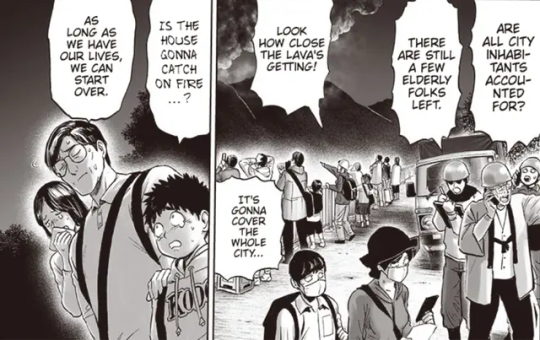
That's just human nature: even in individualistic societies, for every report of looting in the wake of a natural disaster, there are hundreds of people trying to help. And this is a much more collectivist society that has to deal with disasters semi-regularly. That's the sense of looking out for each other in the face of a tragedy bigger than any person he wanted to recreate—only permanently.
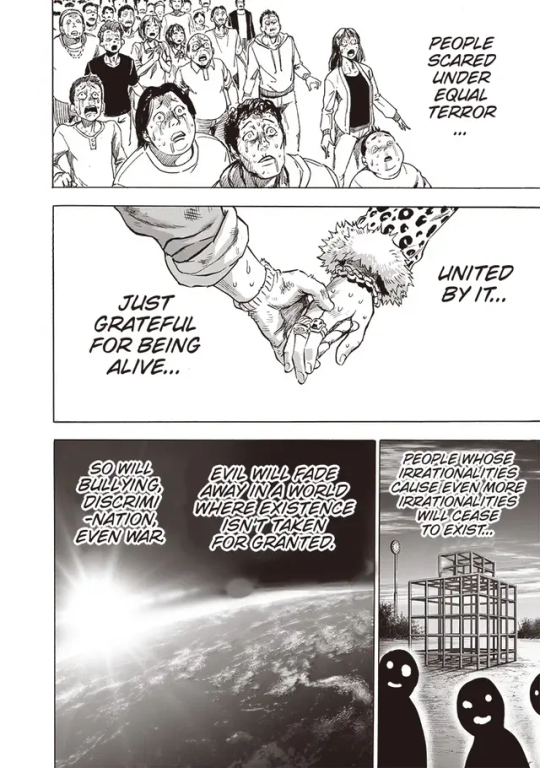
Then we get bits of Garou through the people around him. We got nothing about his parents in the webcomic but in the manga, his parents refuse to see him or get him out of custody. They've given up on him. To make it worse, the audience ONE is writing for understands that Garou is a minor until he's 20 (the law recently changed in Japan but it wasn't even up for debate when ONE started writing OPM). So they've done the equivalent of washing their hands of a 16-year-old. That's got to have hit Garou very, very hard, even if he was estranged from them. He'd have liked it if his father cared enough to tell him what to do.

We see how Bang has literally taken on the role of in loco parentis. It's been interesting to see that the reason Bang has chased after Garou so relentlessly is because he sees himself in the young man. However, we also see that he deeply misunderstands Garou too. Bang beat up people because he was an extremely selfish young man who felt he was entitled to everything.
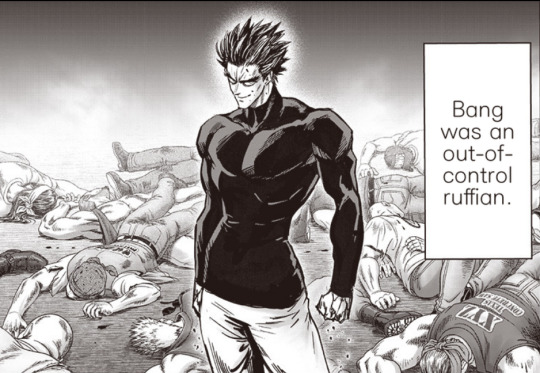
Garou beat up people because he is an extremely thoughtful young man who sees himself as bringing a great good into the world at the expense of some heroes.
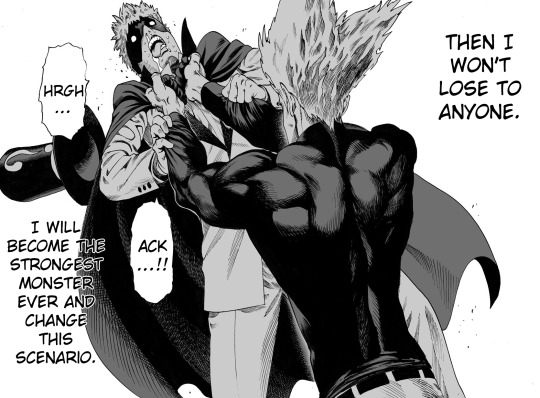
It's definitely going to cause trouble but that's okay -- nothing in life is smooth and such differences are inevitable. With love, such struggles are worthwhile.
Garou's an object lesson in why the energy to do things in the world rarely comes with the power to make those changes. His overly simple solutions were disastrous. But one thing we can also say about Garou: he's a fast learner. He's literally rebuilding his life little by little in the webcomic by rebuilding the world around him. In the manga, he's been given the opportunity to sift through his thinking and find what's genuinely good. We'll see how it all shakes out.
#OPM#meta#Garou#manga#webcomic#the road to hell is paved with good intentions has rarely been truer when it comes to Garou#I am glad the manga has drawn out more context for us to understand him better#and also given him more opportunity to confront his way of thinking
56 notes
·
View notes
Text
Also Dooku was in the same self inflicted trap Anakin put himself in. The mental trap of “it’s too late” and not wanting to face what they’ve done because it would destroy them. “How many people have died because of me” it’s a distinct type of self centered cowardice to say “I’ve already done bad so I can’t ever be good again.I have to keep digging this hole.” They can’t stand to look at the damage they have caused and it only makes everything worse when they double down. THE PARALLELS ARE PARALLELING

#count dooku#anakin skywalker#I need somebody smarter than me to put this into words#tcw#tales of the jedi#the road to hell is paved with good intentions etc etc
753 notes
·
View notes
Text
underrated cabinetduo era was them during new L'manburg, not that anyone was unaware of their dynamic at the time but good lord were so many people annoying abt it
#the speed with which so many people pinned ctubbos morally dubious actions onto quackity and fundy but mostly quackity was astounding#u guys were missing out on the juiciest dynamic 4 some apologist discourse#like it was post Manberg and nobody was over that shit but they had to be and it was the same cabinet but you know who was dead#and quackity is trying to make pulls and moves for power but also very obviously cares abt tubbos wellbeing#and tubbo is a child president haveing the most hellish winter of his life and rapidly losing his ability to gaf abt politics and also his#will to live#its like if the evil advisor whispering over the young king's shoulder had really good intentions actually but ykno how the road to hell is#paved so#🤷♀️#cabinetduo
56 notes
·
View notes
Text
“The road to hell is paved with good intentions.”
It’s a quote I often rolled my eyes at. The common interpretation is that good intentions, when acted upon, may have unintended consequences.
But I recently had a thought. Something I think makes more sense.
Those who believe their cause is good will justify their actions no matter how evil those actions are.
That is something that has been done throughout history. I’m seeing it even now.
A side will do unspeakable evil to their enemies because they believe they are “in the right”, or “We are the good guys”.
It’s easy to point out the evil when it’s your enemies and those you disagree with, but the hardest part is looking at one’s own side, one’s own actions and seeing the truth.
If one wants to be morally right, they must do what is right. Do not use a good cause to try to justify evil. For you are only staining the good cause with the blood of vile action.
I can’t think of anything more vile than committing acts of evil and acting as if it’s good.
“The road to hell is paved with good intentions.”
63 notes
·
View notes
Text
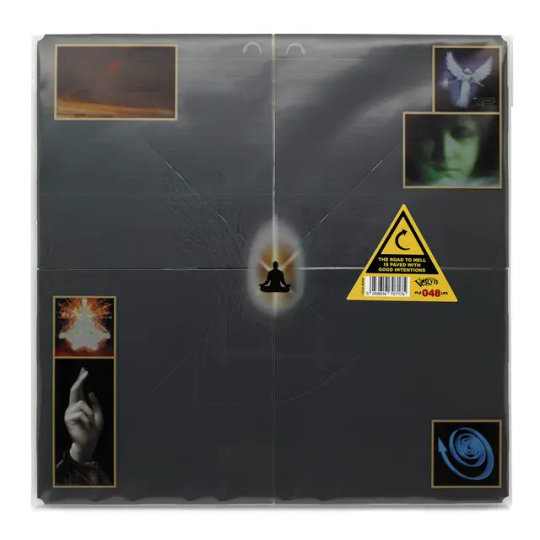
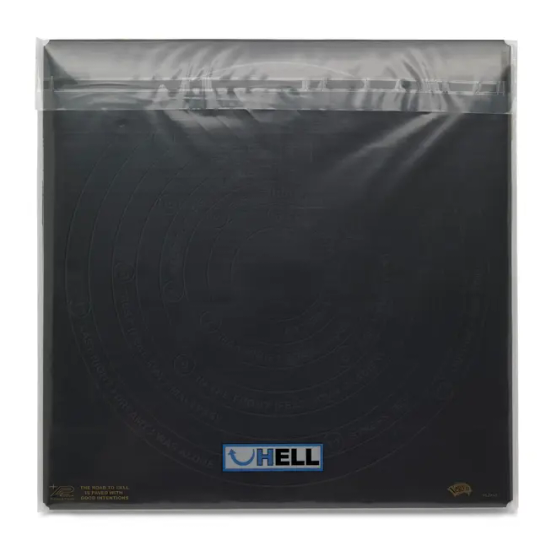






Vegyn - The Road To Hell Is Paved With Good Intentions
20 notes
·
View notes